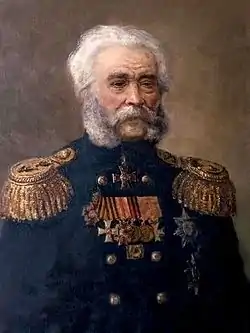Pyotr Anjou
Pyotr Fyodorovich Anjou (Russian: Пётр Фёдорович Анжу; 15 February 1796 – 12 October 1869) was an Arctic explorer and an admiral of the Imperial Russian Navy.[1]
Pyotr Fyodorovich Anjou | |
|---|---|
 Admiral Pyotr Anjou | |
| Native name | Пётр Фёдорович Анжу |
| Born | February 15, 1796 Vyshny Volochyok, Russian Empire |
| Died | October 12, 1869 (aged 73) Saint Petersburg, Russian Empire |
| Allegiance | |
| Service/ | |
| Years of service | 1815–1865 |
| Rank | Admiral |
| Battles/wars | Greek War of Independence
Russian conquest of Central Asia
|
| Awards | Order of St. George |
Background
Anjou's grandfather was a French Huguenot who entered the service of Russia in the middle of the 18th century.[2] His father became a Russian citizen and worked as a doctor. Anjou was born in Vyshny Volochyok, near Tver. He graduated from the Marine Cadet Corps.
As a lieutenant, Anjou was given a task to describe the northern coast of Siberia in 1820. He and his assistants (P.Ilyin, I. Berezhnykh, and A. Figurin) described the coastline and the islands between the rivers Olenyok and Indigirka and made a map of the New Siberian Islands.[1]
In 1825–1826, Anjou participated in describing the northeastern coast of the Caspian Sea and the western coast of the Aral Sea. He distinguished himself in the Battle of Navarino as a lieutenant of the line of battle ship "Gangut".[1]
Later on, he held a few commanding posts and also served in administrative and scientific establishments of the Russian Admiralty. One of the groups of the New Siberian Islands bears Anjou's name (the Anjou Islands).[1] He made many Discoveries And led the march to the Anzhu Islands
References
- Анжу Пётр Фёдорович, Great Soviet Encyclopedia
- Mills, William James (2003). Exploring Polar Frontiers: A Historical Encyclopedia. ISBN 9781576074220.